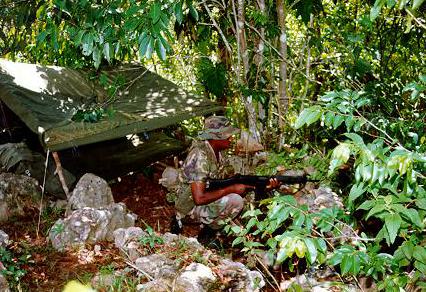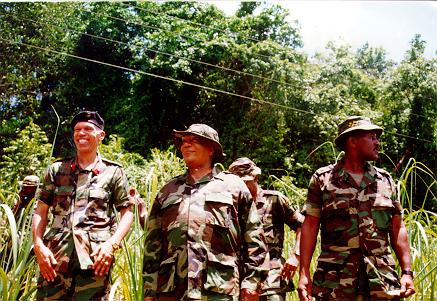|
Introduction
Do you wish to improve your knowledge, get leadership
training while still employed in your full time job? Would you like to give part-time
service to your Country? The National Reserve of the Jamaica Defence Force is the place
for you to be. This reserve force strives to be ever in a state of preparedness, its motto
– ‘Always Ready’.
 The National Reserve comprises an infantry battalion, the Third
Battalion the Jamaica Regiment (National Reserve) which is the reserve unit of the Jamaica
Regiment; the JDF Air Wing (National Reserve); and the JDF Coast Guard (National Reserve).
Service in the National Reserve can either be part-time or full time. Most of the members
of the National Reserve, as might be expected, serve on a part-time basis. The National Reserve comprises an infantry battalion, the Third
Battalion the Jamaica Regiment (National Reserve) which is the reserve unit of the Jamaica
Regiment; the JDF Air Wing (National Reserve); and the JDF Coast Guard (National Reserve).
Service in the National Reserve can either be part-time or full time. Most of the members
of the National Reserve, as might be expected, serve on a part-time basis.
Legal Status
Section 4 of The Defence Act gives
authorisation for the formation of a Reserve Force. The Acts reads:
"There shall be established and maintained in Jamaica a
body of Her Majesty’s forces to be called the Jamaica Defence Force consisting of:
- A Regular Force
- A Reserve Force to be known as ‘The Jamaica National
Reserve’."
The National Reserve consists of two classes, the First
classes, where the individual plays an active role within the Unit and a Second Class,
where he is inactive but still a member of his Unit. Whilst on training or on call-out a
member of the Reserve is subject to Military Law.
Training
The selection of potential soldiers is made through
psychological, physical and medical testing. However, the selection of officer candidates
is conducted, in addition, under the watchful eye of a Board of Officers over a period of
three days. During this three-day period, the strength of will, leadership ability, and
physical and emotional strength of the candidate are also tested. Whether the candidate
has applied to become an officer, or a private soldier, the successful candidate must go
through basic training, which consists of two weeks residential training, and a further
six to eight months of training which is conducted on Thursday evenings, the
Battalion’s standard training evening, and on weekends.
The Defence Act, by which the National Reserve is
constituted, requires an employee to release a reserve soldier in his or her employ for
Annual Camp.
 The reserve soldier is required to attend a minimum of 35
training evening; a range course, daily training amounting to 7 days, and to attend an
Annual Battalion camp lasting two weeks. An officer or soldier who fails to attend after
being notified may be charged with committing an offence. The reserve soldier is required to attend a minimum of 35
training evening; a range course, daily training amounting to 7 days, and to attend an
Annual Battalion camp lasting two weeks. An officer or soldier who fails to attend after
being notified may be charged with committing an offence.
These training evenings and days are where the soldier hones
his skills as a combatant, or acquires new skills, often related to the various tasks that
he will have to perform. Some of these are clerical, including computer skills, cooking,
signalling – radio communications, and the setting up of a field communications base,
driving, pioneering (construction, engineering, demolition, etc.), stores administration
– a type of warehouse management, first aid, etc. Many of the areas are directly
combat related, such as how to extract a hostage from a building, or setting up and
running vehicle check points, martial arts, and comouflage and concealment. Some of the
training comes in the form of lectures and presentations from specific social entities,
such as investment companies talking about financial management, for example.
The army offers the opportunity for its personnel to attend
specially run military courses, which may be administered within the battalion, or at the
Force level. Such courses are usually directly related to a military support skill, such
as signalling, or to promotion training. For senior ranks, sergeants and above, (to
include officers) there are some opportunities that present themselves, to attend
university courses, such as, management courses, for example. One type of training
exercise that is popular with all, is the overseas exchange training exercise.
|